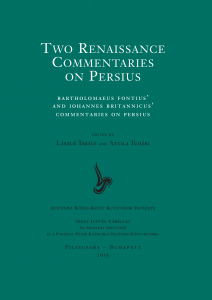
Two Renaissance Commentaries on Persius: Bartholomaeus Fontius and Ioannes Britannicus
Edited by: Takács László, Tuhári Attila
Studia Philologica IV.
Year of release: 2015
Number of pages: XXVIII + 310
Binding: hardcover
Language: Latin
ISBN: 978–963–2775–241
ISSN: 2063–3157
Aulus Persius Flaccus, a Roman poet and satirist who lived in the 1st century BC (34–62), left behind a not too lengthy but significant life work. He left about 600 lines, six satire texts and a 14-line introduction written in limping iambs (choliamb). Despite the small size of his heritage, this corpus is one of the most difficult ancient Latin poetic texts to interpret. The poet who died young used a cleverly constructed metaphorical language that is extremely rich in literary, philosophical and historical references. If read without interpretation, it is impossible to understand. The appearance of his works following his death made his poetry immediately popular. It became a compulsory reading. His works had to be and were even in antiquity. His popularity remained steadfast during the Middle Ages due to the linguistic richness, poetic twists and strict Stoic ethical content of his works which are similar to Christian teachings. His popularity is indicated by the fact that his satires were recorded in more than 600 codices, moreover, about thirty largely unpublished medieval and humanist commentaries have been preserved by libraries. A significant proportion of these commentaries is still awaiting further scientific examination, but it should be mentioned that a collection of commentaries which has preserved certain elements of the ancient commentaries and is attributed to Persius’ teacher, the Stoic philosopher Cornutus (Commentum Cornuti), has existed since the 9th century. The reliability of this has been disputed by many, which was also a motivation to write commentaries on the satire. On the other hand, these texts were also studied at universities, where heated discussions were held about the exact interpretation of certain parts. Persius’ steadfast popularity led to numerous editions of the commentary during the 19th century. Since the end of the 19th century, this intense interest has subsided but is unlikely to cease. However, given the number of unpublished commentaries from the 15th-16th centuries and how many of which are not in line with the expectations of the 21st century, an attempt will be made to republish these texts for the scientific community since they may be of interest to many today. Some are being published for the first time, some have been released before. In this book, the commentary of two humanist scholars was first published, Bartholomaeus Fontius and Ioannes Britannicus, whose interpretations of Persius’ poems, albeit a few years apart, originate from the last third of the 15th century. These works were frequently published together.

 fdfdfd
fdfdfd